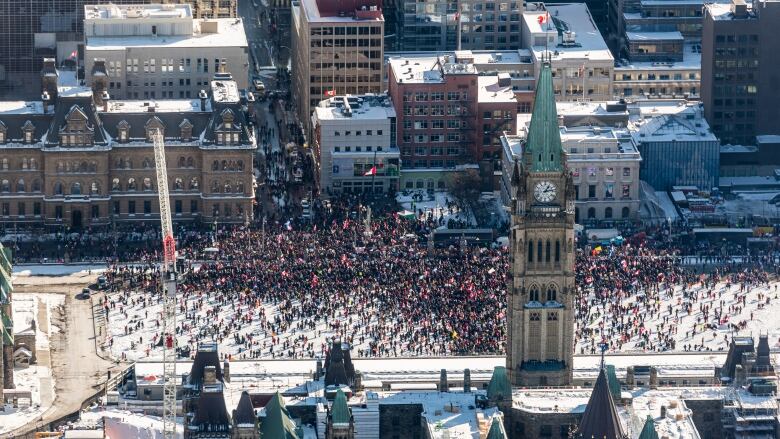Hamilton has spent over $1.5M on extra security guards during COVID-19 pandemic
Expenses include security for vaccine clinics, testing centres, shelters, rec centres

Hamilton has spent $1,529,216.98 on extra security guards since the start of the pandemic to keep places like city-run vaccine clinics, testing centres, shelter programs and recreation centres safe.
City spokesperson Jasmine Graham told CBC Hamilton it spent $851,000 in 2020 and $678,000 in 2021 in extra costs for guards through its corporate security group.
She said the costs don't reflect security guard services for elected officials, staff members or local hospitals. It's unclear if the city uses private security in those cases.
The over $1.5 million includes some costs for security guards due to people opposed to public health measures, but CBC Hamilton wasn't able to get details on the exact amount related to that.
The figure also includes security guards used across various departments, recreation facilities, parks and museums due to staff working remotely.
Graham said the city used extra security staff in housing department efforts, such as for COVID-19 overflow shelter programs at First Ontario Centre and Bennetto Recreation Centre.
WATCH |Parliament Hill protest is costing Ottawa $1 million per day:
CBC Hamilton's report on the city's security guard costs comes as thousands of people continue a nearly week-long protest in Ottawa against public health measures.
Officials with the City of Ottawa say protests outside Parliament Hill are costing roughly $1 million per day and the mayor is looking at ways to recover those costs, including a potential lawsuit against GoFundMe.
A look at other cities
It's unclear how many times other cities in Canada have had to use private security during the pandemic or how much it has cost them.
Beth Gooding, Ottawa's director of public safety service, told CBC Hamilton on Jan. 14 that it has implemented numerous safety measures, such as the use of private security guards, "to ensure the vaccination efforts would be conducted in a safe environment."
At the time, Gooding said threats stemming from people's opposition to public health measures didn't cost the city any extra because it took an "all-hazards" approach when mass vaccination began.
Toronto and the Niagara Region said their cities use local police to provide security for city staff and elected officials.
"This is the approach we have taken with the recent threats to Dr. Hirji, and would be the same for any of our employees," Niagara spokesperson Andrew Korchok said in an email about Dr. Mustafa Hirji, the region's acting medical officer of health.

"While we do not incur specific staffing costs for this response, these threats result in many hours of work from our own employees, and from [police] and other partners, and distracts from the important work that must be done as we respond to the pandemic and work to keep our community safe."
Other cities CBC Hamilton checked include:
- Windsor and London, in southwestern Ontario, which wouldn't share details.
- Vancouver, where a spokesperson said elected officials have received threats more often during the pandemic, but the city hasn't had to use private security.
- Calgary, where a city spokesperson would only say the municipality doesn't use contract security.
'We are still all in this together'
Some provinces have implemented firm measures on protests.
Quebec outlawed protests within 50 metres of schools, daycares, hospitals, medical clinics, mobile clinics, COVID-19 vaccination sites and testing centres. Saskatchewan introduced legislation to ban protests with 50 metres of hospitals and schools.
Also since the start of the pandemic, protesters have targeted elected officials and the local medical officer of health in Niagara.
Karrie Porter, a councillor in St. Catharines, Ont., said she had a large rock thrown through the front window of her home at 3 a.m. ET on Sunday.
Good day to all except the guy who threw a rock through our front window. Look bud, I know the snow removal has been SUPER frustrating but there’s a less shitty way to vent to your Councillor! It’s the snow, right? Not the video I posted of Cap’t Von Trapp ripping the Nazi flag? <a href="https://t.co/yCInh5jqhD">pic.twitter.com/yCInh5jqhD</a>
—@karrieporterEarlier in January, protesters demonstrated outside Porter's home as well as Hirji's home.
Porter said police are investigating the rock-throwing incident, but also said in a statement on social media it was a chance to focus on the "biggest challenges facing our community, including strong services, affordable housing, good healthcare, and social supports that truly leave nobody behind."
"We are going to argue. We are still going to get angry with each other. But we are a community, and we are still all in this together ... Nothing that happens, including attempts to threaten and intimidate me, will stop me from believing that," she wrote.
Asked during a Jan. 10 news conference if she feared for her safety after the protests in Niagara, Dr. Elizabeth Richardson, Hamilton's medical officer of health, said local and provincial police work with the city when any issues arise.
"I've certainly had more share of very unpleasant, nasty communication sent in my direction," she said.
"It's very challenging, especially for those with young children ... it's quite unsettling."
She said the Ontario government has been clear it would support municipalities to keep vaccine clinics, testing centres, elected officials and city staff safe.
With files from CBC News


